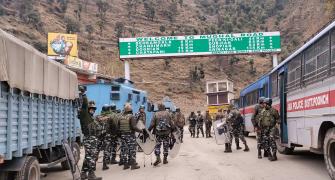More than a week after serial blasts rocked Assam, investigators have found clues that the United Liberation Front of Assom and the NDFB carried out the deadly explosions with the help of Bangladesh-based HuJI's expertise.
Home Ministry sources said the investigators have found enough evidence that the banned ULFA had carried out the
October 30 serial blasts with the help of dominant Bodo militant group NDFB.
This comes in the wake of the Centre expressing concern over the 'paradigm shift' in the northeast militancy.
Some people have been detained by the police and central security agencies, who had allegedly provided logistical support including procuring cars used in the blasts that left over 80 people dead and more than 400 injured, the sources said.
These people have an allegiance with the two banned outfits, the sources said.
Interestingly, NDFB is currently under truce with the security forces and is engaged with the government in peace negotiations.
Images: More than 50 killed in Assam blasts
"We have found that the Bangladesh-based HuJI has provided the expertise to ULFA and NDFB as none of them has the technology to explode such devastating bombs, which claimed more than 80 lives," a Home Ministry official said.
Home Ministry sources said the government is worried over the fact that the northeast militants has started using a deadly mixture of RDX, ammonium nitrate and plasticised explosives.
"At least 80 kg RDX were used to carry out the October 30 serial blasts in Assam. A large quantity of RDX, mixed with Ammonium Nitrate and plasticised explosives, was used as propellants," a Home Ministry official said.
Each of the cars, which were used to carry out three explosions in Guwahati, was laden with 20 to 25 kgs of RDX.
The September 1 serial blasts in Agartala, where terrorists triggered four blasts within an hour, were the first synchronised explosions in the North East. The Assam serial blasts were carried out within a span of just 20 minutes.
ULFA denies role in Assam blasts
"Kokrajhar, where three bombs were exploded, is 250 km away from Guwahati while Barpeta Road, another blast site, is 150 km away. The near simultaneous explosions at the three distant places show how the terrorists worked with precision," the official said, adding, "this is also a new trend in the North East".
"Neither the ULFA nor the NDFB has the expertise to carry out such deadly explosions. Besides, the Harkat-ul-Jehadi Islami has no logistics at a place like Kokrajhar. So a nexus between local outfits with outsiders is evident," the official said.
Assam blasts: Cops probe HuJI-ULFA link
The October 5 meeting of chief secretaries and directors general of North Eastern states, which was attended by National Security Advisor M K Narayanan, Cabinet Secretary K M Chandrasekhar and Union Home Secretary Madhukar Gupta, took stock of the connection between a Naxal group and a Manipuri insurgent group, possibly to procure arms from the North East, which has porous international borders with several foreign countries, the sources said.
"Probably this is the first report of any North East militant group having links with an extremist outfit of mainland," the sources said.
Unlike in the past, there have been growing collaborations among the different insurgent groups in the North East, where most of the groups had links with dominant groups like NSCN but not among themselves.
"But now, if a Tripura militant comes to Guwahati, it is the ULFA which is providing him shelter and logistics," the official said.







